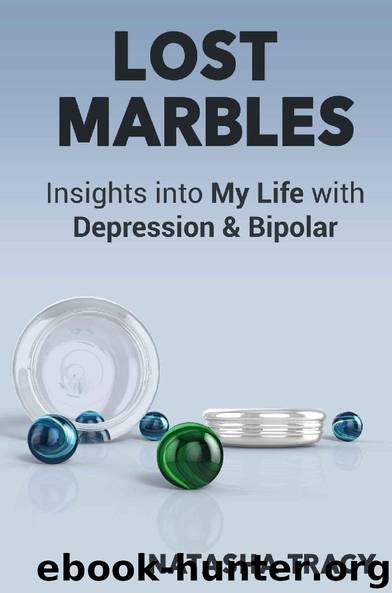Lost Marbles: Insights into My Life with Depression & Bipolar by Natasha Tracy

Author:Natasha Tracy [Tracy, Natasha]
Language: eng
Format: epub
Publisher: UNKNOWN
Published: 2016-10-01T22:00:00+00:00
Chapter 8: Mental Illness Coping Skills
Some people with major depressive or bipolar disorder will experience complete, consistent remission while others will experience remissions with intermittent relapses and still others will experience illness symptoms close to constantly, no matter what; however, all groups of people will live better and the illness will impact them less negatively with good coping skills.
So, what are coping skills? The term “coping skill” is very broad and can include physical changes one makes in one’s life, the way one interacts with others and the way one deals with his thoughts and emotions. In short, coping skills are pretty much anything that falls outside of traditional mental illness treatment and are used to make a person cope a little better with his mental illness.
Why Bother with Coping Skills, I Use Medication?
There are so many reasons why learning coping skills matters. On an everyday basis, coping skills are one of the major things that allow me to function such that I can shower, clean my kitchen, remain employed, maintain relationships, write a book and do other things. I’m the first one to admit that it’s the medication that keeps me alive but I need skills beyond that to improve my quality of life – as does everyone.
Some people, as I said, will be lucky enough to obtain remission, likely mostly because of either medication or spontaneous illness remission; but even those who do need to work at maintaining that wellness and coping skills do just that. No matter how lucky you are with your mental illness treatment coping skills can help.
Developing Coping Skills Is Hard Work
The thing is, no matter which coping skill you choose to work on, it takes commitment. For example, if one is learning them through therapy, one must commit to attending therapy, working during appointments, being completely honest, practicing the skills and finally using those skills in real life. None of this is easy. It takes time as well as grit.
Coping skills can also be learned in other ways, but no matter how they are learned, it’s challenging to put them into practice.
I promise, though, coping skills are what is going to keep one’s marriage together. Coping skills are what’s going to increase one’s chance of a successful recovery. Coping skills are what’s going to help a person reduce the impact of a mood episode. Coping skills are what is going to make a person realize that life is worth it when everything seems destroyed around him.
This chapter aims to highlight some of the coping skills I use day-to-day to keep me from falling down the well and never coming back.
Download
This site does not store any files on its server. We only index and link to content provided by other sites. Please contact the content providers to delete copyright contents if any and email us, we'll remove relevant links or contents immediately.
Should I Stay or Should I Go? by Ramani Durvasula(6785)
Why We Sleep: Unlocking the Power of Sleep and Dreams by Matthew Walker(5642)
Fear by Osho(4085)
Flow by Mihaly Csikszentmihalyi(4053)
Rising Strong by Brene Brown(3782)
Why We Sleep by Matthew Walker(3773)
Too Much and Not the Mood by Durga Chew-Bose(3695)
How to Change Your Mind by Michael Pollan(3679)
The Hacking of the American Mind by Robert H. Lustig(3580)
Lost Connections by Johann Hari(3455)
He's Just Not That Into You by Greg Behrendt & Liz Tuccillo(3303)
Evolve Your Brain by Joe Dispenza(3051)
What If This Were Enough? by Heather Havrilesky(2945)
Resisting Happiness by Matthew Kelly(2888)
Crazy Is My Superpower by A.J. Mendez Brooks(2861)
The Courage to Be Disliked by Ichiro Kishimi & Fumitake Koga(2798)
The Book of Human Emotions by Tiffany Watt Smith(2771)
Descartes' Error by Antonio Damasio(2732)
In Cold Blood by Truman Capote(2685)
